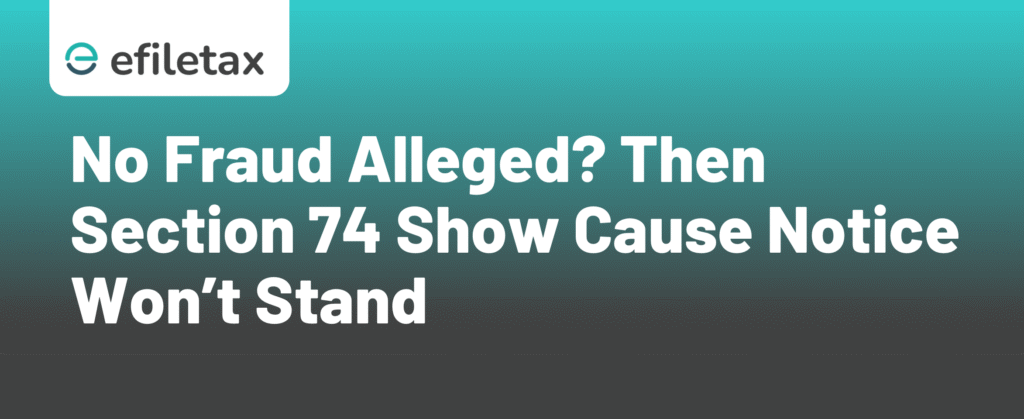
Section 74 Show Cause Notice: What Makes It Legally Unsustainable?
If you’ve received a GST show cause notice under Section 74, but there’s no allegation of fraud, misstatement, or suppression, you might have strong legal ground to challenge it. Several courts have already held that mechanical issue of Section 74 notices—without substantiation—violates natural justice and the CGST Act itself.
Let’s break it down.
What is Section 74 of the CGST Act?
Section 74 of the Central Goods and Services Tax (CGST) Act, 2017 deals with tax evasion involving fraud, willful misstatement, or suppression of facts.
If such intent is present, the law allows:
- Higher penalties (up to 100% of tax)
- Extended limitation period (5 years from relevant date)
So, absence of such allegations makes this section inapplicable.
Key Legal Difference: Section 73 vs Section 74
| Basis of Demand | Section 73 | Section 74 |
|---|---|---|
| Applicability | No fraud or suppression involved | Fraud, suppression, or misstatement exists |
| Time Limit for Notice | 2 years, 9 months | 4 years, 6 months |
| Penalty (if not paid) | 10% of tax (max ₹10,000) | 100% of tax |
So, issuing a Section 74 notice without any intent-based allegation is legally untenable. Courts have quashed such demands.
Legal Precedents Supporting This View
- Delhi High Court – Dhani Projects Ltd. v. Union of India
Held: In absence of any specific allegation or evidence of fraud/suppression, invoking Section 74 was invalid. Direction issued to treat it under Section 73 instead. - Jharkhand High Court – M/s NKAS Services Pvt Ltd. v. State of Jharkhand
Observation: Notices under Section 74 without allegations of intent are unsustainable and vitiated by law. - Punjab & Haryana High Court – Vikram Puri v. UOI [2023]
Reiterated that mere classification dispute or audit objection doesn’t imply suppression. Section 74 can’t be mechanically applied.
Government Clarification
CBIC, via GST flyer and internal circulars, has reiterated that Section 74 must be invoked only when clear evidence of intent to evade tax is present.
“Suppression under GST means deliberate concealment, not mere omission.”
— CBIC, FAQs on Assessment & Audit
Source: cbic-gst.gov.in
Practical Expert Tip
“If there is no charge of intent-based evasion, file a preliminary reply challenging jurisdiction under Section 74 itself. Many cases are quashed at this stage.”
— Efiletax Indirect Tax Consultant Panel
What Should You Do if You Receive a Section 74 Notice Without Fraud Allegation?
- Read the notice carefully. Check if it mentions:
- Fraud
- Suppression
- Misstatement
(Mere mention of Section 74 isn’t enough.)
- Check the grounds. If the notice relates to:
- Clerical error
- Audit disagreement
- Rate misclassification
Then Section 73 is more appropriate.
- File a detailed reply pointing out the absence of fraud/suppression.
- Cite relevant case laws as above.
- Consult a tax expert immediately.
When Is Section 74 Legally Applicable?
✔️ Fake invoicing
✔️ Intentional ITC fraud
✔️ Non-disclosure of outward supply
✔️ Shell companies or benami transactions
Can You Get Relief?
Yes. If the notice was wrongly issued:
- Demand may be dropped.
- You may avoid the 100% penalty.
- You may even get time-barred benefit under Section 73 (2-year limit).
Summary
Section 74 show cause notice is unsustainable without specific fraud or suppression allegation. Courts have quashed such notices as jurisdictionally invalid. Always check if intent to evade tax is clearly stated.
FAQs
Q1: Can a Section 74 notice be converted to Section 73?
Yes, if there’s no fraud/suppression, courts may direct authorities to treat it under Section 73.
Q2: What if the department doesn’t reply to your objection?
You can challenge it before the High Court under Article 226 for violation of natural justice.
Q3: Does receiving a DRC-01 mean you must pay?
No. DRC-01 is just a show cause. You can and should contest it if legally unsound.
Final Thoughts
Not every GST discrepancy is tax evasion. Blindly applying Section 74 without allegations of intent defeats the purpose of the law. Taxpayers must know their rights and respond legally.